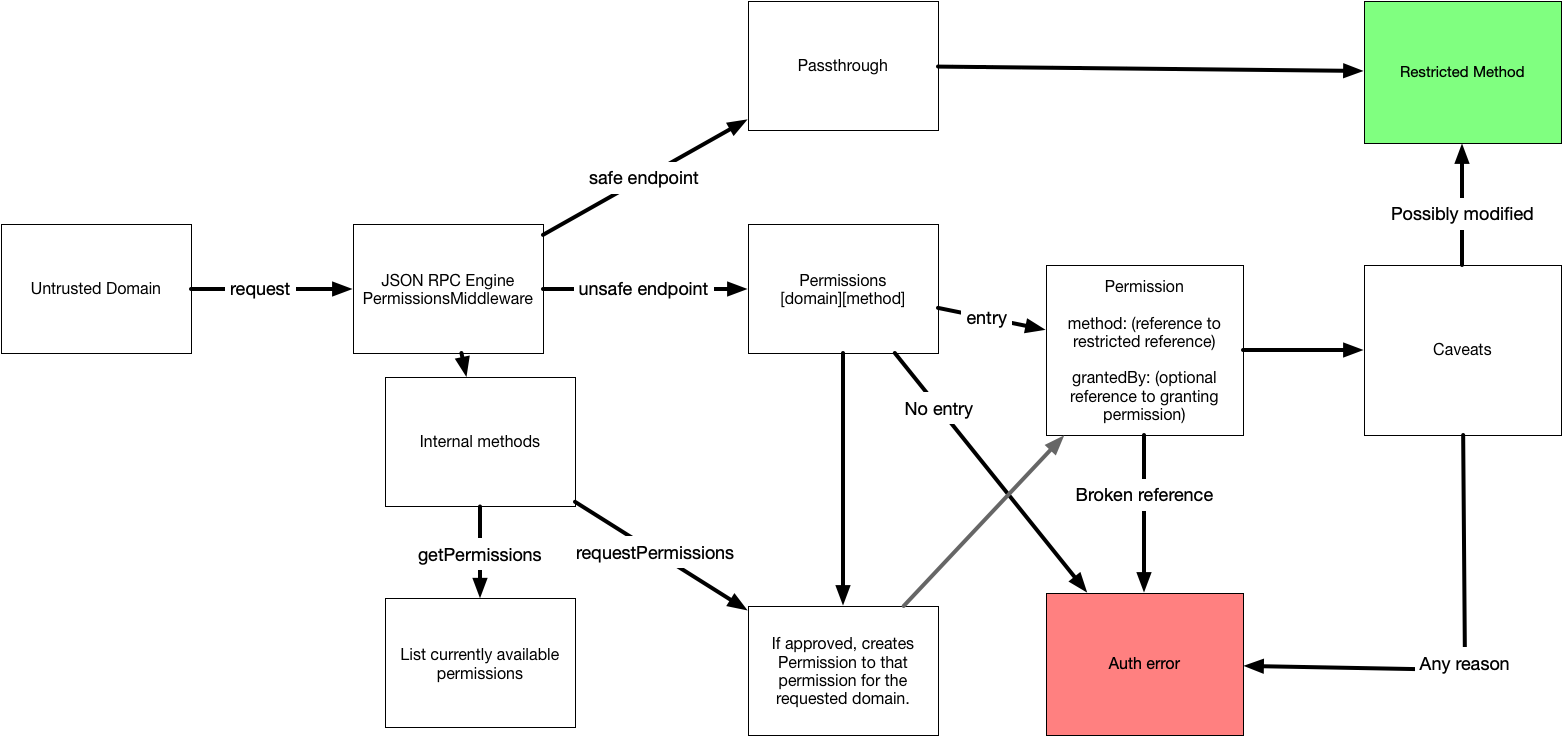A module for managing basic capability-based security over a JSON-RPC API as a middleware function for json-rpc-engine.
For an intro to capability based security and why it makes sense, I recommend this video.
Currently is an MVP capabilities system, with a certain usage assumption:
The consuming context is able to provide a domain to the middleware that is pre-authenticated. The library does not handle authentication, and trusts the domain parameter to the providerMiddlewareFunction is accurate and has been verified. (This was made initially as an MVP for proposing a simple capabilities system around the MetaMask provider API).
This means the capabilities are not valuable without a connection to the granting server, which is definitely fairly acceptable for many contexts (just not like, issuing capabilities intended for redemption in a cryptographically verified smart contract).
npm install json-rpc-capabilities-middleware -S
The capability system is initialized with a variety of options, and is itself a gaba compatible controller.
Once initialized, it exposes a special AuthenticatedJsonRpcMiddleware type method providerMiddlewareFunction(domain, req, res, next, end), which requires an authenticated domain object, followed by normal json-rpc-engine middleware parameters.
It will simply pass-through methods that are listed in the safeMethods array, but otherwise will require the requesting domain to have a permissions object, either granted by user, by approval on request, or by delegation from another domain that has the desired permission.
This module uses typescript, and so referring to the .d.ts files for interface definitions could be helpful. The tests are also very demonstrative.
const Engine = require('json-rpc-engine')
const createCapabilities = require('json-rpc-capabilities-middleware')
const capabilities = createCapabilities({
// Supports passthrough methods:
safeMethods: ['get_index']
// optional prefix for internal methods
methodPrefix: 'wallet_',
restrictedMethods: {
// Restricted methods themselves are defined as
// json-rpc-engine middleware functions.
'send_money': {
description: 'Allows sending your money away freely.',
method: (req, res, next, end) => {
sendMoney()
res.result = 'Success!'
end()
}
},
},
/**
* A promise-returning callback used to determine whether to approve
* permissions requests or not.
*
* Currently only returns a boolean, but eventually should return any specific parameters or amendments to the permissions.
*
* @param {string} domain - The requesting domain string
* @param {string} req - The request object sent in to the `requestPermissions` method.
* @returns {Promise<bool>} approved - Whether the user approves the request or not.
*/
requestUserApproval: async (domainInfo, req) => {
const ok = await checkIfUserTrusts(domainInfo, req)
return ok
},
// Same state that is emitted from `this.store.subscribe((state) => {})`,
// Following the `obs-store` module framework.
// can be used to re-instantiate:
initState: {
domains: {
'login.metamask.io': {
permissions: [
{
parentCapability: 'eth_write',
date: '0',
}
]
}
}
}
})
// Unlike normal json-rpc-engine middleware, these methods all require
// a unique requesting-domain-string as the first argument.
const domain = 'requestor.thatsite.com'
engine.push(capabilities.providerMiddlewareFunction.bind(capabilities, domain))
engine.push(finalMiddleware)
engine.start()The capabilities system adds new methods to the RPC, and you can modify what they are with a prefix of your chocie with the constructor param methodPrefix:
- getPermissions() - Returns the available (otherwise restricted) capabilities for the domain.
- requestPermissions(options) - Triggers the authroization flow, probably prompting user response, and creating the requested permissions objects if approved.
{
method: 'restrictedMethodName',
id: '63b225d0-414e-4a2d-8067-c34499c984c7', // UUID string
date: 0, // unix time of creation
granter: 'another.domain.com', // Another domain string if this permission was created by delegation.
caveats: [ // An optional array of objects describing limitations on the method reference.
{
type: 'static', // The static caveat only returns the specified static response value.
value: 'Always this!'
}
]
}
This module is in an exploratory MVP state. It probably deserves more testing, scrutiny, consideration, maybe a TypeScript conversion, and a healthy beta period before I'd want to really trust it to a lot of value.
I've got it working with a branch of metamask which you can use with the sample site.
